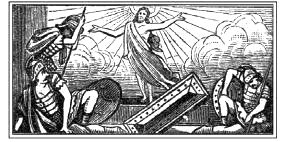
| Contents | Veni, redemptor gentium O Come, Redeemer of the Earth |
Adventus |

Veni, redemptor gentium was composed by St. Ambrose of Milan (340-397). The current form of the hymn actually begins with Ambrose' second stanza. The original opening verse was ``Intende, qui regis Israel''. The evidence in favor of St. Ambrose' authorship is, in part, due to a passing mention of it by St. Augustine. St. Augustine was baptized by St. Ambrose and was a good friend of his. St. Augustine both specifically mentions and quotes three of St. Ambrose' canonical hymns: "Aeterne rerum Conditor", "Deus Creator omnium", and "Iam surgit hora tertia". St. Augustine then goes on to mention "Veni, redemptor gentium" indirectly. Instead of giving the full title, he only gives a brief quote from the middle of the hymn, which matches that of the Veni, redemptor gentium. The hymn is also mentioned by other authors of the period as being by St. Ambrose. Pope Celestine mentions it in a sermon against the Nestorians, which he preached before a synod at Rome in 430. The Pope attributes it to St. Ambrose. Likewise Bishop Faustus of Riez (A. D. 455) and Cassiodorus (died 575) also quote it and attribute it to St. Ambrose. The hymn is not used in the Breviarium Romanum, but does appear in the Liturgia Horarum. It is used as the Advent hymn for the Office of the Readings for the octave before Christmas.
|
| VENI, redemptor gentium, ostende partum Virginis; miretur omne saeculum: talis decet partus Deum. |
O COME, Redeemer of the earth, and manifest thy virgin-birth. Let every age in wonder fall: such birth befits the God of all. |
| Non ex virili semine, sed mystico spiramine Verbum Dei factum est caro fructusque ventris floruit. |
Begotten of no human will but of the Spirit, Thou art still the Word of God in flesh arrayed, the promised fruit to man displayed. |
| Alvus tumescit Virginis, claustrum pudoris permanet, vexilla virtutum micant, versatur in templo Deus. |
The Virgin's womb that burden gained, its virgin honor still unstained. The banners there of virtue glow; God in his temple dwells below. |
| Procedat e thalamo suo, pudoris aula regia, geminae gigas substantiae alacris ut currat viam. |
Proceeding from His chamber free that royal home of purity a giant in twofold substance one, rejoicing now His course to run. |
| Aequalis aeterno Patri, carnis tropaeo cingere, infirma nostri corporis virtute firmans perpeti. |
O equal to the Father, Thou! gird on Thy fleshly mantle now; the weakness of our mortal state with deathless might invigorate. |
| Praesepe iam fulget tuum lumenque nox spirat novum, quod nulla nox interpolet fideque iugi luceat. |
Thy cradle here shall glitter bright, and darkness breathe a newer light where endless faith shall shine serene and twilight never intervene. |
| Sit, Christe, rex piissime, tibi Patrique gloria cum Spiritu Paraclito, in sempiterna saecula. Amen. |
All praise, eternal Son, to Thee, whose advent sets Thy people free, whom, with the Father, we adore, and Holy Ghost, for evermore. Amen. |
| Latin from the Liturgia Horarum. Translation by J. M. Neale (1818-1866). Original first stanza: Intende, qui regis Israel, super Cherubim qui sedes, appare Ephrem coram, excita potentiam tuam et veni. |
<- Prev |
Next-> |
